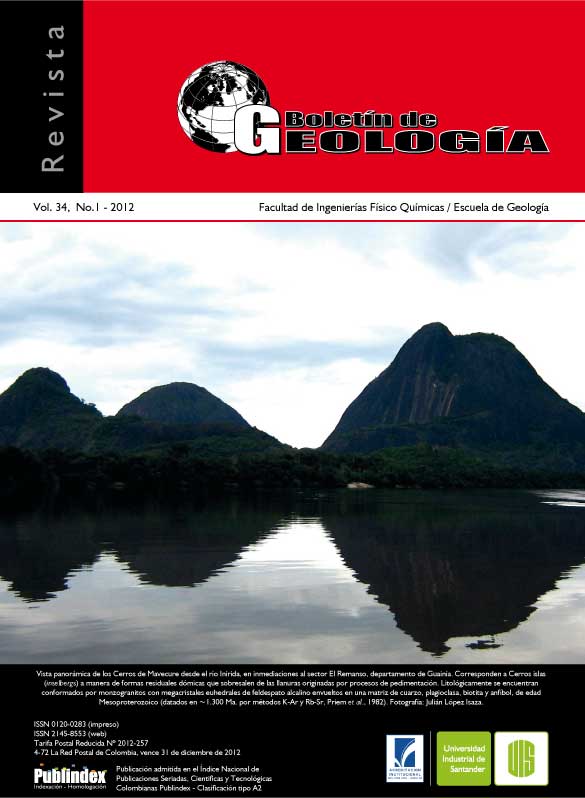Publicado 2012-08-24
Cómo citar
Resumen
Mineralogical transformations during firing of clays from the Laboyos Valley at the Upper Magdalena Basin(Colombia) were studied. Firing of clays was carried out in the temperature range 800–1200 °C under oxidizing conditions. The mineralogical transformations were investigated by X-ray diffraction (XRD) and scanning electron microscopy (SEM). Important compositional differences in the neoformed phases were observed inthe clays. Typical assemblages with quartz, illite, kaolinite, mica, halloysite, potassium feldspar and plagioclase were observed. Several mineral phases were identified in the fired clays, with the reaction products including mullite, residual quartz, hematite, amorphous phase (glass generated by melting of feldspars and clays) in thefired clays.
Keywords: Mineralogical transformations, Clays, Laboyos Valley, Neoformed phases, Assemblages.
Descargas
Referencias
Amjad, J. 2000. Investigation of phases in soils used for brick-making. M.Phil. Thesis, University of Punjab, Lahore (Pakistan)
Aras, A. 2004. The change of phase composition in kaolinite- and illite-rich clay-based ceramic bodies. Applied Clay Science, 24(3-4): 257-269
Baccour, H., Medhioub, M., Jamoussi, F., Mhiri, T., and Daoud, A. 2008. Mineralogical evaluation and industrial applications of the Triassic clay deposits, Southern Tunisia. Materials Characterization, 59(11): 1613-1622
Bakker, J.G.M., Kleinendorst, T.W., and Geirnaert, W. 1989. Tectonic and sedimentary history of a late Cenozoic intramontane basin (The Pitalito Basin, Colombia). Basin Research, 2(3): 161-187.
Barsoum, M.W. 1997. Fundamental of Ceramics. McGraw-Hill, Singapore, 603p
Bogahawatta, V.T.L., and Poole, A.B. 1996. The influence of phosphate on the properties of clay bricks. Applied Clay Science, 10(6): 461-475.Bortz, S.A., Marusin, L.S., and Monk, C.B. Jr. 1990
A critical review of masonry durability standards. Proceedings of the 5th North American Masonry Conference, Illinous, USA, pp. 1523-1536
Brindley, G.W., and Maroney, D.M. 1960. High–temperature reactions of clay mineral mixtures and their ceramic properties: II, Reactions of Kaolinite-Mica-Quartz Mixtures Compared With the K2O-Al2O3-SiO2 Equilibrium Diagram. Journal of the American Ceramic Society, 43(19): 511-516.
British Geological Survey 2007. Brick clay: Geology and mineral planning factsheets for Scotland. Consulted on March 21 2010. http://www.scotland.gov.uk/Publications/2007/06/04121200/1
Brownell, W.E. 1976. Structural clay products. Springer-Verlag, New York, 231p
Cardenas, J.I., Núñez, A., and Fuquen, J.A. 2003. Geología de la Plancha 388 Pitalito – Memoria Explicativa. INGEOMINAS. Bogotá, Colombia, 128p
Carney, J.N. 2010. Comparative petrography of pottery sherds and potential geological source materials in the East Midlands. Open Report of the British Geological Survey, OR/10/034
Castellanos, O. (2005). Caracterización geológica de arcillas del Valle de Laboyos, Municipio de Pitalito, Huila. Bistua, 3(2): 43-53
